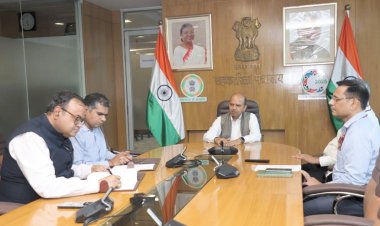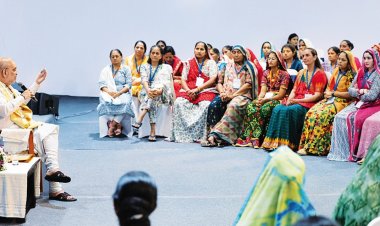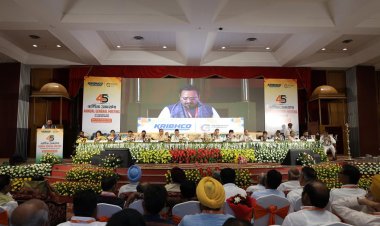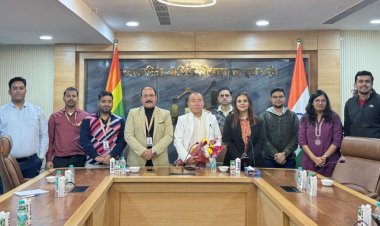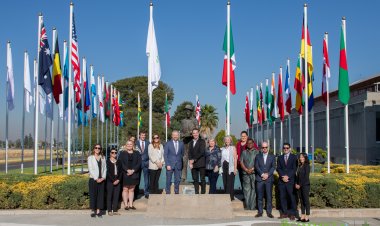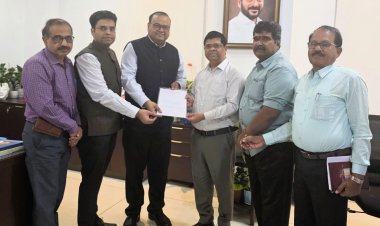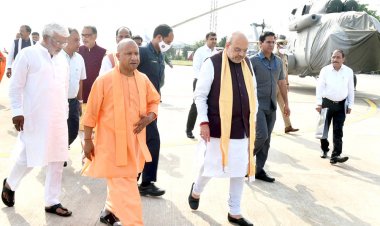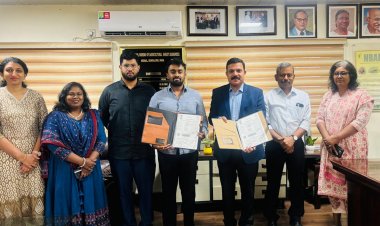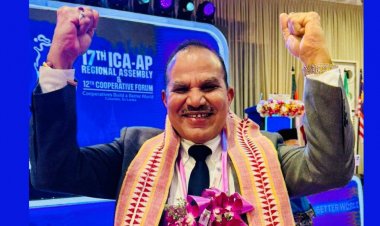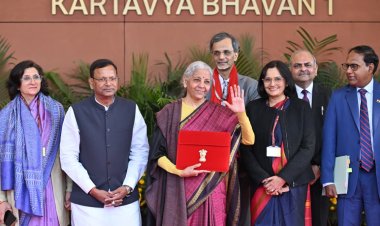Professionalism has to be cultured in cooperatives: Prakash Naiknavare
Speaking about the significance of cooperatives in various sectors, Prakash Naiknavare, MD, NFCSF Ltd, said that cooperatives had a share of 55 per cent in India’s record sugar exports of 100 lakh tonnes projected this year. Naiknavare, who represented the cooperative sugar sector that has five crore cane farmers, was speaking at the third session of the Dialogue on “Sahakar se Samriddhi: Many pathways” organized by Rural Voice in association with Sahakar Bharati. The topic for the third session was “Way forward to make cooperatives relevant”.
Speaking about the significance of cooperatives in various sectors, Prakash Naiknavare, MD, NFCSF Ltd, said that cooperatives had a share of 55 per cent in India’s record sugar exports of 100 lakh tonnes projected this year. Sugar cooperatives in Maharashtra, he said, generated direct and indirect employment. They not only operated sugar mills but also helped run hospitals, medical colleges, educational institutes, consumer stores, cooperative banks, etc. This can be followed in other sectors and other places, too.
Prakash Naiknavare, who represented the cooperative sugar sector that has five crore cane farmers, was speaking at the third session of the Dialogue on “Sahakar se Samriddhi: Many pathways” organized by Rural Voice in association with Sahakar Bharati. The topic for the third session was “Way forward to make cooperatives relevant”. It was moderated by Dr Biswajit Dhar from JNU. You may watch this session of the Dialogue by clicking on the video link given above.
Naiknavare raised the issue of lack of professionalism in the functioning of cooperatives and said that this could be addressed through training and technology. “Professionalism has to be cultured.” Besides, he said, cost reduction cannot be ignored. In Maharashtra, cooperatives serve as the ladder to political power. In order to serve this purpose, grand events are held on several occasions by the cooperatives and a lot of money gets spent. This does not happen in Gujarat, Naiknavare said.
He said “we only know firefighting” and advised sugar cooperatives to proceed with a long-term aim. He said the cooperatives should pay heed to marketing, something that they do not do as of now. They should build sugar brands and market them in the domestic and international markets. Besides, cooperatives should not send “clerks” to training programmes, but their senior officials. Naikanavare found “soft skills” missing in the sector. However, he expressed happiness with the new Ministry of Cooperation that “they are really working with a great speed.” He saw light at the end of the tunnel for cooperatives and yearned to reach there fast.
Govt should support without interfering: Dr Saswata Biswas
Dr Saswata Biswas from IRMA, Anand, focused on agriculture cooperatives, which he felt had very weak bargaining power when compared to corporate. The VUCA world (VUCA stands for volatility, uncertainty, complexity and ambiguity) today, he said, had come a long way from 1841, when the principles for cooperatives were originally established. Oilseeds cooperatives, for example, had to function in a world of price volatility. Waiting for “permission” had been a stumbling block for them.
Dr Biswas emphasized adopting professionalism in the working of cooperatives. He said that he failed to understand why the government should interfere with the cooperatives just because it supported them. This does not happen in the case of private companies. The Registrar does not have any say in appointments in the case of the latter.
Most of the cooperatives function in an old fashion even today, said Dr Biswas. “They are in the Jurassic Park era.” The use of technology can bring transparency to their functioning. And member commitment is the result of how technologically savvy you are. Dr Biswas also emphasized reforms in cooperative governance. Cooperative elections are sometimes worse than the general elections, he said. People who have no interest in the business get elected.
Govt should implement the suggestions made: Ram Iqbal Singh
NACOF Chairman Ram Iqbal Singh said that it was important to focus on the shortcomings of the cooperatives and that the government implemented the suggestions being made at the Dialogue. What matters is to focus on the problems the country faces, rather than emulating foreign countries, Singh said. He said that it was virtually impossible for small farmers to reach the government officers and share their problems. The officers don’t have time to meet.
What really matters is not subsidies etc., but how to make farmers self-reliant, said Singh. Emphasizing the role of national and state-level organizations, Singh said that there was no alternative to cooperatives. Besides, there should be ease of amendment for cooperative laws. If NCUI does its work properly, it would send the right message down the ladder to the state-level and district-level organizations. A beginning needs to be made somewhere, Singh said.
Nature herself functions on cooperation: Dr DN Thakur
Dr DN Thakur, President, Sahakar Bharati, said that no cooperative has failed so far on its own; rather, the failure had been brought about by external factors. “Now, if cooperatives can’t fail, how can they be irrelevant?” Cooperatives have always been relevant and will continue to be so. Rather, there have been several variants of cooperatives, he said: SHGs (Self-Help Groups), JLGs (Joint Liability Groups), FPOs (Farmer Producer Organizations) etc. Be it food security, energy security or social harmony, it is only through cooperatives that these can be ensured.
Dr Thakur said that a community-driven model could never fail because it started with the beginning of civilization. Nature herself functions on cooperation. It is cooperation that leads to balance in Nature. Once you understand this fundamental principle, you’ll neither call cooperatives irrelevant nor ever allow them to become so. There cannot be any alternative to cooperatives, said Dr Thakur. The absence of cooperatives will only aggravate problems.
According to Dr Thakur, if cooperatives are to be made more relevant, their ownership should be restored to the original owners, viz the members. Cunning and oneupmanship need to give way to simplicity, which should not be confused with stupidity. Simplicity means transparency, Dr Thakur said. “We have gone from the heart to the head; the journey now needs to be reversed.” This can be achieved through creating awareness about the spirit of cooperation. Besides, education and training are the two other pillars to make cooperatives relevant.



 Join the RuralVoice whatsapp group
Join the RuralVoice whatsapp group

















